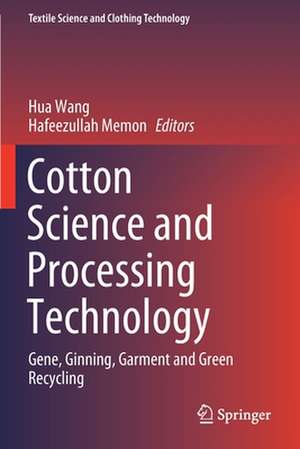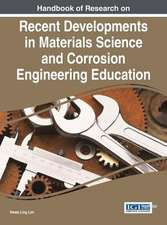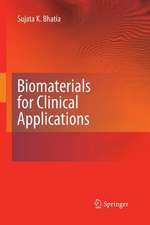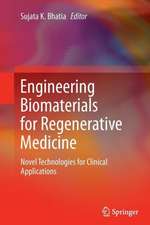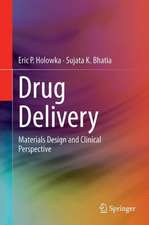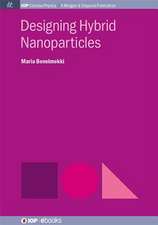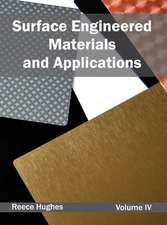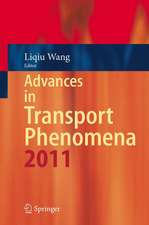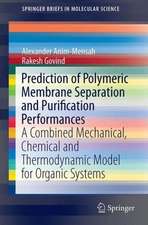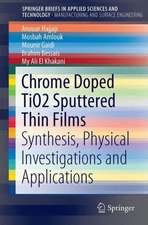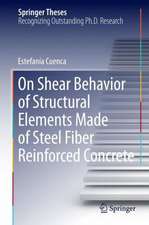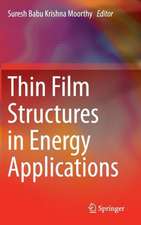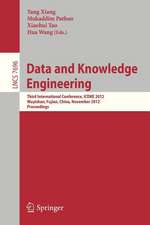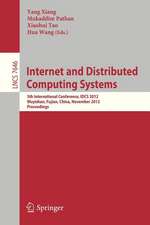Cotton Science and Processing Technology: Gene, Ginning, Garment and Green Recycling: Textile Science and Clothing Technology
Editat de Hua Wang, Hafeezullah Memonen Limba Engleză Paperback – 10 noi 2021
| Toate formatele și edițiile | Preț | Express |
|---|---|---|
| Paperback (1) | 710.75 lei 6-8 săpt. | |
| Springer Nature Singapore – 10 noi 2021 | 710.75 lei 6-8 săpt. | |
| Hardback (1) | 964.23 lei 6-8 săpt. | |
| Springer Nature Singapore – 9 noi 2020 | 964.23 lei 6-8 săpt. |
Din seria Textile Science and Clothing Technology
- 18%
 Preț: 901.57 lei
Preț: 901.57 lei - 15%
 Preț: 580.68 lei
Preț: 580.68 lei - 15%
 Preț: 588.83 lei
Preț: 588.83 lei -
 Preț: 386.81 lei
Preț: 386.81 lei - 15%
 Preț: 460.75 lei
Preț: 460.75 lei - 18%
 Preț: 1010.33 lei
Preț: 1010.33 lei -
 Preț: 385.47 lei
Preț: 385.47 lei - 15%
 Preț: 579.67 lei
Preț: 579.67 lei - 15%
 Preț: 573.79 lei
Preț: 573.79 lei - 15%
 Preț: 578.70 lei
Preț: 578.70 lei -
 Preț: 384.09 lei
Preț: 384.09 lei - 15%
 Preț: 517.67 lei
Preț: 517.67 lei - 15%
 Preț: 521.26 lei
Preț: 521.26 lei - 18%
 Preț: 785.11 lei
Preț: 785.11 lei - 18%
 Preț: 786.66 lei
Preț: 786.66 lei -
 Preț: 383.33 lei
Preț: 383.33 lei - 15%
 Preț: 573.97 lei
Preț: 573.97 lei -
 Preț: 386.39 lei
Preț: 386.39 lei - 19%
 Preț: 483.63 lei
Preț: 483.63 lei -
 Preț: 377.35 lei
Preț: 377.35 lei - 15%
 Preț: 642.18 lei
Preț: 642.18 lei - 15%
 Preț: 584.26 lei
Preț: 584.26 lei - 15%
 Preț: 639.73 lei
Preț: 639.73 lei - 18%
 Preț: 791.99 lei
Preț: 791.99 lei -
 Preț: 377.35 lei
Preț: 377.35 lei - 15%
 Preț: 642.68 lei
Preț: 642.68 lei - 15%
 Preț: 697.65 lei
Preț: 697.65 lei
Preț: 710.75 lei
Preț vechi: 836.17 lei
-15% Nou
Puncte Express: 1066
Preț estimativ în valută:
135.100€ • 141.100$ • 112.56£
135.100€ • 141.100$ • 112.56£
Carte tipărită la comandă
Livrare economică 04-18 aprilie
Preluare comenzi: 021 569.72.76
Specificații
ISBN-13: 9789811591716
ISBN-10: 9811591717
Ilustrații: XII, 565 p. 314 illus., 238 illus. in color.
Dimensiuni: 155 x 235 mm
Greutate: 0.8 kg
Ediția:1st ed. 2020
Editura: Springer Nature Singapore
Colecția Springer
Seria Textile Science and Clothing Technology
Locul publicării:Singapore, Singapore
ISBN-10: 9811591717
Ilustrații: XII, 565 p. 314 illus., 238 illus. in color.
Dimensiuni: 155 x 235 mm
Greutate: 0.8 kg
Ediția:1st ed. 2020
Editura: Springer Nature Singapore
Colecția Springer
Seria Textile Science and Clothing Technology
Locul publicării:Singapore, Singapore
Cuprins
Introduction to cotton and its seed.- Classification and genetic diversity of cotton (Gossypium).- Genomic tools to study phylogeny and diversity (in the US and China).- Agricultural and planting of cotton.- Harvesting and storage of cotton.- Cotton ginning technology (background economics and industry).- Cotton contamination.- Physical structure, properties and quality of cotton.- Cotton fiber testing (HVI and AFIS).- Recent advancement in cotton Spinning.- Cotton melange yarn industry.- Cotton and weaving Technology.- Knitting technology for cotton.- Pre-treatment of cotton.- Cotton fiber and yarn dyeing.- Cotton Based Clothing.- Chemical Modification of Cotton for advanced applications.- Cotton as Bio-Materials.- Recycling and LCA of cotton.
Notă biografică
Prof. Dr. Hua Wang received his bachelor’s degree in Dyeing and Finishing Engineering from Tianjin Textile Institute of Technology, China, in 1984. In 1994, he completed his post-graduation in Management Engineering from China Textile University (now Donghua University, China). In 2006, he completed his doctoral degree in Textile Science and Engineering from Donghua University, China. He has long-term working experience in cotton and wool textile production, printing and dyeing industry, as well as international trade. In 2012, he was appointed as Senior Visiting Scholar at Deakin University in Australia and studied cotton and wool fibers. In 2017, he was appointed as Chief Research Fellow of the “Belt and Road Initiative” international cooperation development center of the textile industry by the China Textile Federation. In 2018, he was appointed as an Honorary Professor by Tashkent Institute of Textile and Light Industry, Uzbekistan, and also by the Ministry of Education and Science and the Ministry of Industrial Innovation and Development of Tajikistan. In 2019, he was a Visiting Professor at the Novi Sad University of Serbia, as an expert committee of the International Silk Union.
At present, Prof. Wang is engaged in the teaching and research of textile intelligent manufacturing technology, digital printing technology, and textile intangible cultural heritage in Donghua University. His main research directions include but not limited to the manufacturing and application technology of raw materials for wool textile, digital printing of textiles, and research on world textile history. He has completed five provincial and ministerial level projects, two individual research projects works, and three joint research works. He has authored four invention patents and published more than 50 papers. Also, he has published three textbooks in the field of textile as editor, including “Textile Digital Printing Technology.” He has been teaching five courses for undergraduate, master, and doctoral students, and one full English course for international students at Donghua University. He has also been a chief member for establishing joint laboratories and research bases for natural textile fiber and processing in Xinjiang Autonomous Region and Central Asian countries. In 2018, he won the only “Golden Sail Golden Camel” award of Donghua University. In 2019, he won the second prize in the science and technology progress of China Textile Federation. He has been awarded the title of “Best Teacher and Best Tutor” by overseas students of Donghua University for the last three consecutive years.
Dr. Hafeezullah Memon received his B.E. in Textile Engineering from Mehran University of Engineering and Technology, Jamshoro, Pakistan, in 2012. He served at Sapphire Textile Mills as Assistant Spinning Manager for more than one year while earning his Master’s in Business administration from the University of Sindh, Pakistan. He completed his masters in Textile Science and Engineering from Zhejiang Sci-Tech University, China, and Ph.D. degree in Textile Engineering from Donghua University in 2016 and 2020, respectively.
Dr. Memon focuses on the research of natural fibers and their spinning, woven fabrics, their dyeing and finishing, carbon fiber reinforced composites, recyclable, and smart textile composites. His recent research interests also include natural fiber-reinforced composites, textiles and management, textile fashion, and apparel industry. Since 2014, Dr. Memon has published more than 40 peer-reviewed technical papers in international journals and conferences, and he has been working over more than ten industrial projects.
Dr. Memon was a student member of Society for the Advancement of Material and Process Engineering and has served as Vice President for SAMPE-DHU Chapter. He is a Full Professional Member of the Society of Wood Science and Technology. Moreover, he is a registered Engineer of the PakistanEngineering Council. He has served as a Reviewer of several international journals and has reviewed more than 200 papers.
Dr. Memon is a recipient of the CSC Outstanding Award of 2020 by the Chinese Scholarship Council, China. He was awarded Excellent Social Award for three consecutive years during his doctoral studies by International Cultural Exchange School, Donghua University, China, and once Grand Prize of NZ Spring International Student Scholarship and third Prize of Outstanding Student Scholarship Award in 2018 and 2019, respectively. Moreover, he received Excellent Oral Presentation Award in 2018 at 7th International Conference on Material Science and Engineering Technology held in Beijing, China, and also Best Presentation and Best Research Paper at Student Research Paper Conference 2012, Mehran University of Engineering and Technology, Pakistan. He has also received “Fun with Flags-Voluntary Teaching Award” and “Jing Wei Cultural Ambassador” by International Cultural Exchange School, Donghua University, China, and International exchange project “Around the Globe” of the Experimental School affiliated to Donghua University, China, for the I-Teach Program. Currently, he is serving as a post-doc fellow at the College of Textile Science and Engineering (International Institute of Silk), Zhejiang Sci-Tech University, Hangzhou, China.
At present, Prof. Wang is engaged in the teaching and research of textile intelligent manufacturing technology, digital printing technology, and textile intangible cultural heritage in Donghua University. His main research directions include but not limited to the manufacturing and application technology of raw materials for wool textile, digital printing of textiles, and research on world textile history. He has completed five provincial and ministerial level projects, two individual research projects works, and three joint research works. He has authored four invention patents and published more than 50 papers. Also, he has published three textbooks in the field of textile as editor, including “Textile Digital Printing Technology.” He has been teaching five courses for undergraduate, master, and doctoral students, and one full English course for international students at Donghua University. He has also been a chief member for establishing joint laboratories and research bases for natural textile fiber and processing in Xinjiang Autonomous Region and Central Asian countries. In 2018, he won the only “Golden Sail Golden Camel” award of Donghua University. In 2019, he won the second prize in the science and technology progress of China Textile Federation. He has been awarded the title of “Best Teacher and Best Tutor” by overseas students of Donghua University for the last three consecutive years.
Dr. Hafeezullah Memon received his B.E. in Textile Engineering from Mehran University of Engineering and Technology, Jamshoro, Pakistan, in 2012. He served at Sapphire Textile Mills as Assistant Spinning Manager for more than one year while earning his Master’s in Business administration from the University of Sindh, Pakistan. He completed his masters in Textile Science and Engineering from Zhejiang Sci-Tech University, China, and Ph.D. degree in Textile Engineering from Donghua University in 2016 and 2020, respectively.
Dr. Memon focuses on the research of natural fibers and their spinning, woven fabrics, their dyeing and finishing, carbon fiber reinforced composites, recyclable, and smart textile composites. His recent research interests also include natural fiber-reinforced composites, textiles and management, textile fashion, and apparel industry. Since 2014, Dr. Memon has published more than 40 peer-reviewed technical papers in international journals and conferences, and he has been working over more than ten industrial projects.
Dr. Memon was a student member of Society for the Advancement of Material and Process Engineering and has served as Vice President for SAMPE-DHU Chapter. He is a Full Professional Member of the Society of Wood Science and Technology. Moreover, he is a registered Engineer of the PakistanEngineering Council. He has served as a Reviewer of several international journals and has reviewed more than 200 papers.
Dr. Memon is a recipient of the CSC Outstanding Award of 2020 by the Chinese Scholarship Council, China. He was awarded Excellent Social Award for three consecutive years during his doctoral studies by International Cultural Exchange School, Donghua University, China, and once Grand Prize of NZ Spring International Student Scholarship and third Prize of Outstanding Student Scholarship Award in 2018 and 2019, respectively. Moreover, he received Excellent Oral Presentation Award in 2018 at 7th International Conference on Material Science and Engineering Technology held in Beijing, China, and also Best Presentation and Best Research Paper at Student Research Paper Conference 2012, Mehran University of Engineering and Technology, Pakistan. He has also received “Fun with Flags-Voluntary Teaching Award” and “Jing Wei Cultural Ambassador” by International Cultural Exchange School, Donghua University, China, and International exchange project “Around the Globe” of the Experimental School affiliated to Donghua University, China, for the I-Teach Program. Currently, he is serving as a post-doc fellow at the College of Textile Science and Engineering (International Institute of Silk), Zhejiang Sci-Tech University, Hangzhou, China.
Textul de pe ultima copertă
This book summarizes all different fields of cotton fiber, including genetics, fiber chemistry, soft materials, textile, and fashion engineering. It also contains some new applications such as biomaterials, nanocoated smart fabrics, and functional textiles. Moreover, the significant improvement recently in gene modification and gene technology is introduced. This book discusses all these aspects in a more straightforward way, and new illustrations will help readers to understand the contents. It is intended for undergraduate and graduate students who are interested in cotton science and processing technologies, researchers investigating the updated applications of cotton in various fields as well as industrialists who want to have a quick review of the cotton and its different stages.
Caracteristici
Combines cotton studies from gene to garments for the first time Provides up-to-date information at one place about cotton industry and bridges the research gap between various cotton industries Fits as the reference book for the universities with textile engineering major in countries along the Belt and Road Initiative (BRI) corridors
